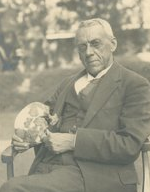(单词翻译:单击)
与此同时,在地球的另一端,南非约翰内斯堡的威特沃特斯兰德大学的澳大利亚裔解剖学负责人雷蒙德·达特于1924年收到了一个非常完整的小孩头骨,带有完好的面部、下颌以及所谓的颅腔——一个天然的大脑模型——它是在卡拉哈里沙漠边缘一个名叫塔翁的地方的石灰岩采石场发现的。达特马上发现,这并非是杜布瓦发现的爪哇人那样的直立人,而是与猿更为接近的远古猿人。他推断它的生存时间距今有200万年左右,井将其明明为南方古猿非洲种,或者说“非洲南方猿人”。在发表于《自然》杂志的报告中,达特称塔翁化石与人类“有惊人的相似之处”,并且建议需要为他的发现建立一个崭新的科:人属猿科(“人猿科”)。
The authorities were even less favorably disposed to Dart than they had been to Dubois. Nearly everything about his theory—indeed, nearly everything about Dart, it appears— annoyed them. First he had proved himself lamentably presumptuous by conducting the analysis himself rather than calling on the help of more worldly experts in Europe. Even his chosen name, Australopithecus, showed a lack of scholarly application, combining as it did Greek and Latin roots. Above all, his conclusions flew in the face of accepted wisdom. Humans and apes, it was agreed, had split apart at least fifteen million years ago in Asia. If humans had arisen in Africa, why, that would make us Negroid, for goodness sake. It was rather as if someone working today were to announce that he had found the ancestral bones of humans in, say, Missouri. It just didn't fit with what was known.
达持在权威那里所受到的冷遇比杜布瓦有过之而无不及,几乎有关达特的理论的一切——实际上,好像几乎有关达特本人的一切——都令他们很不高兴。首先,他自己搞分析,没有要求比较世故的专家提供帮助,证明他是目中无人。连他为化石取的名字,南方古猿——将希腊语和拉丁语词根组合在一起,也显示出他的学术能力的欠缺。最为要命的是,他的观点与约定俗成的理论大相径庭。大家一致认为,人和猿至少在1500万年前在亚洲分道扬镳。如果人类是从非洲出现的,看在老天爷的面子上,我们岂不成了尼格罗人种(黑人种)?!这就好比今天某个上班族声称,他在比方说美国密苏里州,发现了人类祖先的化石一样。这明显与已有的知识搭不上边。

罗伯特·布罗姆
达特惟一有名望的支持者是出生于苏格兰的罗伯特·布罗姆,一个非常聪明,可是性情有些古怪的物理学家和古生物学家。比如,布罗姆有个习惯,天气暖和在野外考察的时侯身上一丝不挂,而天气是经常很暖和的。而且据知,他曾在一些贫穷而又温顺的病人身上做可疑的解剖实验。那些病人死后——这种情况也时有发生,他会把他们的尸体埋在自己的后花园里,日后再挖出来研究。


